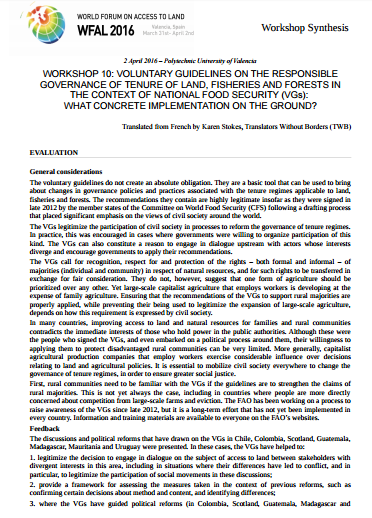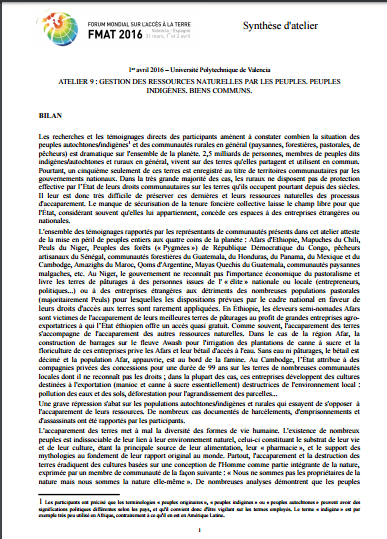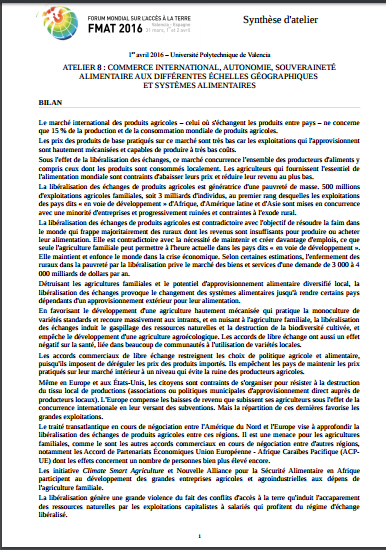Location
The goal of the WFAL 2016 had been to organise a world forum in 2016 to address the major issues linked to unequal access to land, natural resources (see The Call). Finally, the global assembly took place in Valencia, Spain (31st March, 1-2 April 2016) with more than 400 participants from 70 countries from today at the Global Forum on Access to Land and Natural Resources.
Ten years after the World Forum on Agrarian Reforms (Valencia, Spain, 2004) and the International Conference on Agrarian Reform and Rural Development (Porto Alegre, Brazil, 2006) the trends seemed unchanged if not worse.
Making a precise assessment of the situation had been imperative. An evaluation of the short and long terms consequences had been essential. It couldn’t must ignore none of the great economical, social, political and environmental prejudices due to the ongoing processes. It was the condition to identify responses able to solve the problems.
Implementing such an analysis had been possible according to the signatories of the WFAL 2016 Call, if citizens from every continent and the organizations in charge of representing or guaranteeing their interets could effectively debate into a structured and contradictory process: farmer and other civil society organisations, governmental organisations, indepedant or public research institutes.
The WFAL 2016 Call aimed at creating the conditions necessary for such a debate, with the guarantee that each one’s point of view and analysis had been taken into consideration by all, towards the invention of the most constructive proposals.
Members:
Resources
Displaying 11 - 15 of 25WORKSHOP 10: VOLUNTARY GUIDELINES ON THE RESPONSIBLE GOVERNANCE OF TENURE OF LAND, FISHERIES AND FORESTS IN THE CONTEXT OF NATIONAL FOOD SECURITY (VGs): WHAT CONCRETE IMPLEMENTATION ON THE GROUND?
The voluntary guidelines do not create an absolute obligation. They are a basic tool that can be used to bring about changes in governance policies and practices associated with the tenure regimes applicable to land, fisheries and forests. The recommendations they contain are highly legitimate insofar as they were signed in late 2012 by the member states of the Committee on World Food Security (CFS) following a drafting process that placed significant emphasis on the views of civil society around the world.
ATELIER 9 : GESTION DES RESSOURCES NATURELLES PAR LES PEUPLES. PEUPLES INDIGÈNES. BIENS COMMUNS.
Les recherches et les témoignages directs des participants amènent à constater combien la situation des peuples autochtones/indigènes et des communautés rurales en général (paysannes, forestières, pastorales, de pêcheurs) est dramatique sur l’ensemble de la planète. 2,5 milliards de personnes, membres de peuples dits indigènes/autochtones et ruraux en général, vivent sur des terres qu’elles partagent et utilisent en commun. Pourtant, un cinquième seulement de ces terres est enregistré au titre de territoires communautaires par les gouvernements nationaux.
WORKSHOP 9: COMMUNITY MANAGEMENT OF NATURAL RESOURCES. INDIGENOUS MANAGEMENT. COMMON GOODS.
Research and direct witnessing by participants allow realization of the extent to which the situation of native/indigenous peoples and rural communities in general (peasant, forest dwelling, pastoral and fishing) is dramatic everywhere on the planet. 2.5 billion people, members of so called indigenous/native peoples and rural populations in general, live on lands that they share and use in common. However, only a fifth of these lands are registered as community territories by national governments.
ATELIER 8 : COMMERCE INTERNATIONAL, AUTONOMIE, SOUVERAINETÉ ALIMENTAIRE AUX DIFFÉRENTES ÉCHELLES GÉOGRAPHIQUES ET SYSTÈMES ALIMENTAIRES
Le marché international des produits agricoles – celui où s’échangent les produits entre pays – ne concerne que 15 % de la production et de la consommation mondiale de produits agricoles.
Les prix des produits de base pratiqués sur ce marché sont très bas car les exploitations qui l’approvisionnent sont hautement mécanisées et capables de produire à très bas coûts.
WORKSHOP 8: INTERNATIONAL TRADE, AUTONOMY, FOOD SOVEREIGNTY AT DIFFERENT GEOGRAPHICAL SCALES AND FOOD SYSTEMS
The international market for agricultural products – where products are traded between countries – represents only 15% of production and world consumption of agricultural products.
Prices of basic commodities traded in this market are very low because the farms that supply it are highly mechanised and capable of producing at very low cost.




